The Emerald Season
- Sidra Monreal
- Mar 10, 2019
- 19 min read

"We drive across this usually," said our guide, as I looked in awe at the massive river before me. The Luangwa was encroaching into our camp, making boat landings easy, but causing the guides visible concern about how closely it was approaching the lodge. Such is the Emerald Season in Zambia. The river makes for stunning the views from the lodge, and also meant that we needed to take a boat to go on game drives. This only enhanced the sense of adventure that already permeates Zambia and added to the intoxicating feeling of remoteness.
Our trip centered around Robin Pope Safari camps, who run a wonderful collection of lodges including the few that stay open during the Emerald Season in South Luangwa National Park. We were the only visitors at our first lodge, Luangwa River Camp, and enjoyed the privilege of having the lodge, guides, and vehicles to ourselves. Robin Pope camps manage to feel both rugged and luxurious, open to the wild while providing exceptional guiding and delicious meals.
We traversed the river in a metal fishing boat, en route to our first game drive. On the far bank, we climbed into the Land Cruiser, eager to explore. The ground was saturated and inches of water sat atop the earth, hidden by the pullulating tall grasses. The air smelled of freshly turned soil and growth. It was a duck’s heaven, and every turn of our wheels scared up a new species of water bird to check off our list. There were hamerkop and knob-billed ducks, and spur-winged goose and Hadada ibis, and even woolly-necked storks, all reveling in the watery joys of the season.














As we made our way back on water-logged roads toward the boat, thunder began to crack in the distance, while bolts of lightning illuminated the skies. Rain fell steadily as we climbed into the little boat and, as we crossed river in a lightning magnet, my heart raced happily and I wondered how many crocodiles and hippos lurked below. The storm blew fiercely through our camp that night, knocking everything off the counters in our chalet while making the mosquito netting fly about wildly. In the morning, we woke to find clearing skies and enjoyed coffee and eggs as we marveled at the progress of the river toward our camp.
On our morning drive, I spotted lion footprints beside our vehicle, perfectly preserved in the wet, red soil and we turned to follow them. Humorously, they made a sharp turn across the road behind where we were just driving, and right beside the road was an adult female taking a leisurely nap. We pulled up beside her and switched off the engine. After some time, she sat up and sniffed the air in an adorable fashion. A herd of impala approached on the opposite side of our vehicle. She continued to smell the air, reminding me of Ferdinand the Bull happily smelling flowers, although in this case her intentions were perhaps not so innocent. Luckily for the impala, another vehicle pulled up and caused them to reverse their approach, saving them from an unhappy fate.













































Mid-day, we had a welcome rest, feeling grateful that the break in rain the landed at the perfect time. The pool was a heavenly oasis in the hot sun, and I watched Vervet monkeys and baboons play in front of me, enhancing the already wonderful river view. By the time we crossed the Luangwa for our evening drive, the clouds had gathered once again. Approaching the opposite bank, a hippo snorted at us and quickly vanished beneath the surface with a whoosh. It was my first time (but thankfully not last) being so close to a hippo, and when Yumba put the oar down on the side of the boat and it brushed against my arm, I jumped about a mile! By the time we mounted the Land Cruiser, it was pouring. I put on a warm poncho, carefully covering my camera equipment, and smiled at the magnificent landscape. I love the rain. I knew photos this evening would be atmospheric, and just hoped that the animals hid near enough to the road to find them.
Approaching a bend in the road, my heart stopped as I saw what every safari-goer wants to see: spots. A female leopard, soaked from the rain, crossed the road right in front of us. We angled our vehicle to watch her walk through the woods,= when a second leopard, her one-year old cub, emerged from the dense grasses. The dewdrops clung to the vegetation and his fur, and he followed his mother’s expert navigation. The woodlands were so flooded that the best path for them was on the same road we were traveling on, and we had the privilege of carefully following behind the pair for some time, until the mother located a suitably dry bush for them to rest under.
Moving on, we stopped near a pond and got out of the vehicle to enjoy sundowner drinks. I stepped into a hippo print to compare foot sizes while sipping passion fruit juice happily and watching the animals grunting nearby. A large troop of baboons ran about, the babies chasing one another mischievously. The setting sun reflected against the calm waters and the entire area was aglow. A hippo stood out of the water nearby and was silhouetted against the blue and orange sky. When the sun dipped below the horizon, we climbed back into the vehicle, turned a spotlight on, and began our night drive back, scanning the trees and roads for nocturnal creatures. Luck was with us, and two lionesses hunted just along the sides of the road, One female called out in a mighty roar as she walked, communicating with the lion ahead. The deep, guttural sound reverberated through the air and into my bones. First one leopard and then another, in a territory surprisingly nearby the first, crossed the road into our spotlight as we watched, also on the hunt. I could not believe our good fortune to view so many predators in one drive. Approaching the boat landing, lady luck smiled upon us once again as Yumba’s spotlight caught the reflection of eyes in the trees: a leopard slept on a branch not far from the road. What a night.

























We woke to lukewarm temperatures and pastel skies that held the promise of a beautiful day. Could this be our first day with no rain? Although the skies were clear, the roads were almost impassable, and those that were dry just the day before were now covered in a foot of water, which our Cruiser and driver handled with great expertise. I reveled in the bumpy ride as we managed our way over the difficult terrain.
I told our guide, Jonah, that I’d like to search for crowned cranes, so we headed toward a wide-open field where we would have a good chance of spotting some. When we arrived at our intended savannah, I was rewarded to find one of these stunning birds perched majestically atop a tree. We continued to traverse the large plain looking for more cranes when we sighted movement in the distance. I looked through my 600mm lens and saw that there was not one, not two, but five lionesses making a slow approach. My mouth gaped in awe at their presence. Against my instincts, Jonah pulled the Land Cruiser around to their side rather than stopping and letting them approach us straight-on. We were rewarded with the most stunning backdrop as the lionesses plopped down one by one to rest in the sun. We switched off the engine to observe. The lazy predators stretched and yawned, enjoying a leisurely morning.
One of the sleeping lions sat up regally and surveyed the savannah. A herd of zebra milled about in the distance. She eventually walked toward her napping pride-mates and they bumped heads with great affection, much like my house cat does to me. The sun grew increasingly brutal, and the lions felt it as much as I did. At this point, two other safari vehicles had also parked nearby. One of the females stalked through the grasses directly toward us, before veering off toward a couple self-driving. The lioness hugged the shade of their vehicle and laid down just next to the back tires. A second and third lioness followed her lead, and copied her good idea. The driver leaned out of his window to video tape, and the her head shot up to affix him with an intense glare.
The lions do not bother with humans when they are in vehicles. They consider you to be one with the vehicle, and you are neither a threat nor of interest to them–you are inconsequential to these queens of the savannah. Another lioness made her way through the grasses, and this time chose our Land Cruiser as her place of respite. She walked around the front of our vehicle, her mouth mere inches from Jonah’s foot in our totally open Cruiser. Jonah told me he’d had a lion lick his boot once before in a similar situation, as he did his best not to react.
It was then my turn to have a close encounter. She walked up right next to me, so close that I could have reached down to pet her without stretching. I had to lose my telephoto lens and switch to a wide angle just to capture the moment. I controlled my movements to be slow and deliberate so as not to pique her prey drive, and was able to take photos of her from above, while chatting with Jonah. The lioness did not remotely mind our presence or react, although she could clearly see me. At one point she looked up at me and made direct contact with her intense, golden eyes and I could really feel the power of this predator through that gaze alone. She, however, was just happy to be in the shade. Meanwhile, the Zambian sun was baking my skin, and I opened my bag while the lioness cleaned her paws to take out sunscreen. Passengers in another safari vehicle took photographs of me as I calmly applied sunscreen while within easy reach of the great cat, and I thought “what a wonderful sunscreen commercial this would make!” The passenger in the self drive vehicle was less intelligent about his movements and he suddenly popped the top of his vehicle to lean out over the three lions resting below him. Hi sudden movement made the lions stand up suddenly and take notice of him, and our guide yelled at him to get back in his vehicle. It is important to never forget that these are wild animals, to understand their behavior, and temper your own behavior accordingly, exciting as their presence may be. Two other lionesses came and laid down to my right with their pride-mate. How very lucky I felt.
The group of zebras approached while the fifth lioness lay in the tall grasses to our left. They appeared to have no idea that someone lurking nearby would love to eat them. The lions, however, had misguidedly focused their attention instead on a group of zebras in the far distance. As they stood to look at this far group, the closer group of zebra took notice and sounded an alarm call. One zebra stood watch as the rest of the herd made an exit to another part of the field, before the brave watchman joined them. After several wonderful hours enjoying the closeness of these magnificent animals, it was time for us to return to camp. Jonah started the engine, a lioness right next to his foot, and the three of them jumped away from the Land Cruiser. I photographed the three of them standing together with my wide angle, and sighed in sadness to leave this once in a lifetime moment.



































































































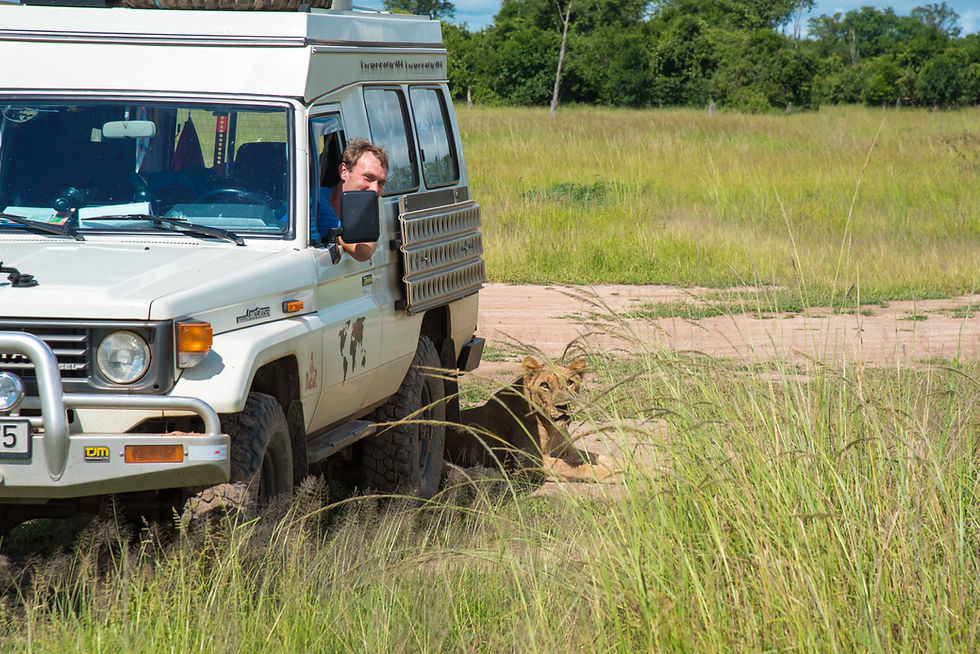













The sun held strong, and it was still a beautiful day when we went out again for our evening drive. We returned to see if the lionesses were in the same area and if the male belonging to the pride had returned, but found the lazy cats sprawled out under a tree doing what they do best: sleeping. Satisfied with our morning encounter, we moved on to capture other wildlife in this especially lovely golden hour. Our first discovery was a pair of crowned cranes, and I was delighted to photograph them in the far superior lighting to my morning session.
I marveled at a herd of zebra in a field of swaying grasses. The insects flying about seemed to twinkle like fairy dust in this magical lighting. We spotted a baby zebra laying under a tree, not frolicking with the rest of the herd, and worried that he was hurt. One of the adults called to him, and he stood up and ran excitedly to join the group. I saw what I thought was mud all over his face and we laughed, wondering how it could have happened. However, looking back on my photographs it looks as though the poor thing has a skin condition which had caused him to lose the hair on his face. I guess we have answered the age old question of whether zebras are black with white stripes or white with black stripes.
We then moved on to observe a herd of elephants. A massive male marched majestically toward us, the light illuminating his tusks. It also called attention to something strange–he was missing the tip of his trunk. This likely was a struggle for him, as elephants use this appendage like we use our hands, but they have only the one. He seemed quite healthy in spite of this disability, so I was glad that he had adapted well. We had some difficulty driving to our sundowner location, as a spunky elephant was guarding her baby as well as the road. We drove forward, and the protective elephant flapped her ears and mock charged repeatedly. After several tries and giving her an increasing girth, we were able to pass by the wonderful family. We enjoyed sundowner drinks again by the hippo pond. I decided that I think their grunts are more like hearty chortles and wondered what joke one of them had told.













































In the morning, it was time to head upriver to our next camp, Nsefu. Nsefu was the first photographic safari lodge in Zambia and while I was terribly sad to say goodbye to our host, Daudi, and our guide, Jonah, with whom we had shared so many laughs, I was excited to see what the new location had in store for us. It was to be a three hour ride upriver, and while we did not see much wildlife on the way, we got to marvel at the many camps not open during the Emerald Season and see that it is for good reason. Water rose above what were once viewing decks attached to chalets, and our new guide, Willy, stopped to take photographs of the rare levels of flooding. We dropped off supplies at a camp on the way, as the workers who maintain the property throughout the rainy months are completely isolated from civilization. We passed some elephants grazing on the banks, but they were quite skittish around the boat’s motor.
We arrived at the historic Nsefu camp to discover a beautifully serene location along the riverbed. There, too, the flooding was evident and areas where guests would usually dine were completely underwater. From our chalet we could hear hippos grunting and watch waterbirds enjoying the bounty of the season. Our hostess, Katherine, a young British ex-pat who was living my dream having moved to Africa, informed us that Luangwa River Camp had to close down after we left due to the flooding, and we would be moved to Nkwali camp rather than returning there after our stay at Nsefu. We were sad that we would not be going back to our amazing guide and host at the River Camp, but also excited to experience a third Robin Pope Camp.
Outside of our door, a masked weaver worked diligently on his nest, flying back and forth between the grasses and the nest's framework. These birds are just fascinating to watch, as they split the grasses with their beaks to create the ideal addition to their nest. They then weave it (hence their name) into the nest, as one might craft a scarf. The rain started to pour down again, and we watched the river rise closer to our chalet and wondered if we were to get flooded out of a second camp. I lay in bed enjoying the sound of the rain and a mid-day nap, and by the time we headed out for our next adventure, the skies had cleared. The Emerald Season at Nsefu does not allow for game drives, but these are replaced by river journeys. We headed back onto the water with Willy to explore the channels and flooded fields by way of little boat. Again, the birding was amazing and we saw numerous species in abundance. We pitied a herd of impala who were stuck on a strip of land, flooded in on all sides. Crocodiles swam about the shore in droves, eager to take advantage of their vulnerable situation, should they decide to attempt a swim to drier ground. We floated down the Luangwa and enjoyed sundowners on our boat, before landing back at camp for another wonderful meal.










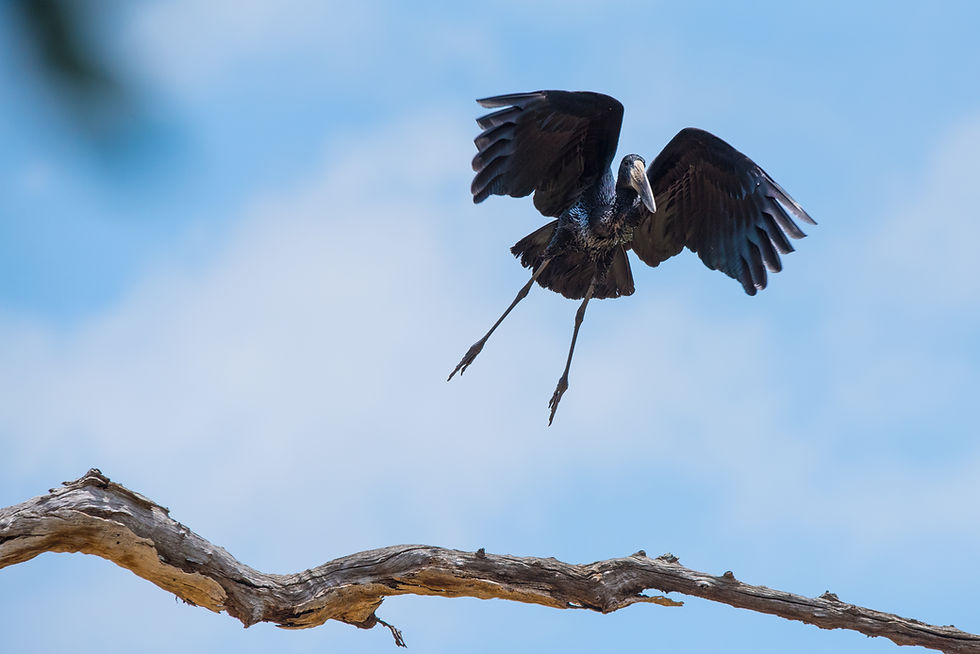





















In the morning, we navigated through twisting channels, which presented a challenging mixture of shallow water covering what was once savannah and churning currents attempting to lead us astray. I was thrilled to see hippos out of water, their rotund bodies and glowing personalities oh so charming. Although they have bad reputations as the animals responsible for the most human deaths in Africa, they are quite safe to be around this time of year. The water is deep everywhere, and it provides an easy escape for them. With a path out of danger, the hippos just hide beneath the water in safety, and their shy and cautious temperament can go unthreatened.
At last, we arrived at our promised destination, and it was indeed awe-inspiring. In the middle of a large channel, two tall trees stood proudly protected by the flooding. An enormous colony of hundreds of yellow-billed built their nests in these trees. The storks flew back and forth between the riverbank and their tree, collecting and building. Some ambitiously carried entire branches complete with greenery, while others returned with mere twigs to adorn their almost-completed nests. It was fascinating to watch them on the riverbanks fastidiously selecting their construction materials. Our guide was visibly happy to see that I was enjoying the stork colony as much as he does. I think this is one of his favorite places. We floated around and around the trees, and so much was going on it was hard to decide what to photograph. Not only were there yellow-billed storks, but an occasional grey heron and open-billed stork also made its nest in this perfectly protected location. Hippos peered above the water with their cautious eyes, assessing our motives, before disappearing below the surface. Willy said we would return again to the colony tomorrow, and I already couldn’t wait.


























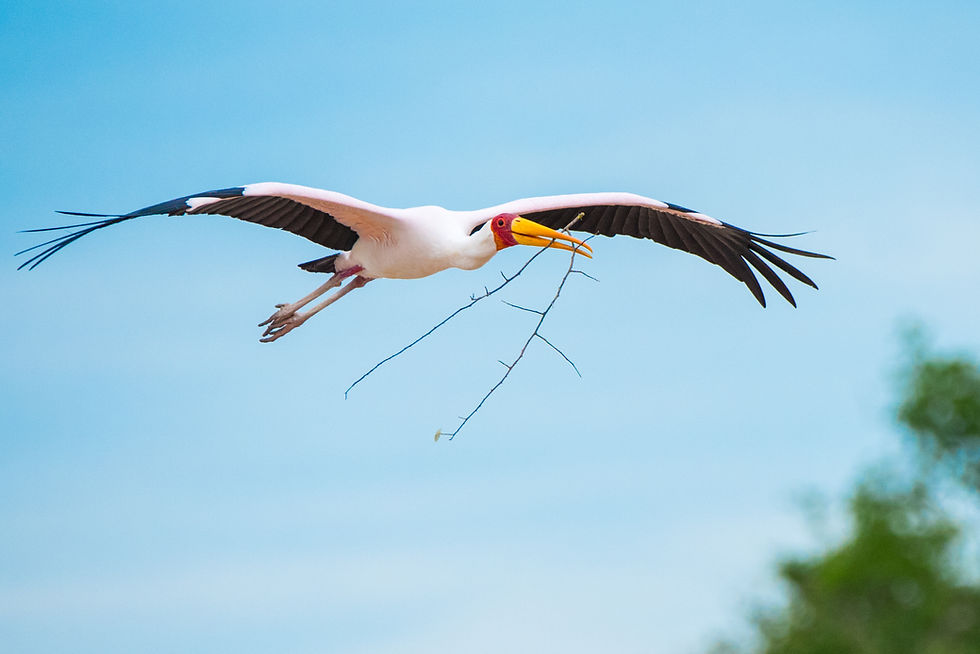

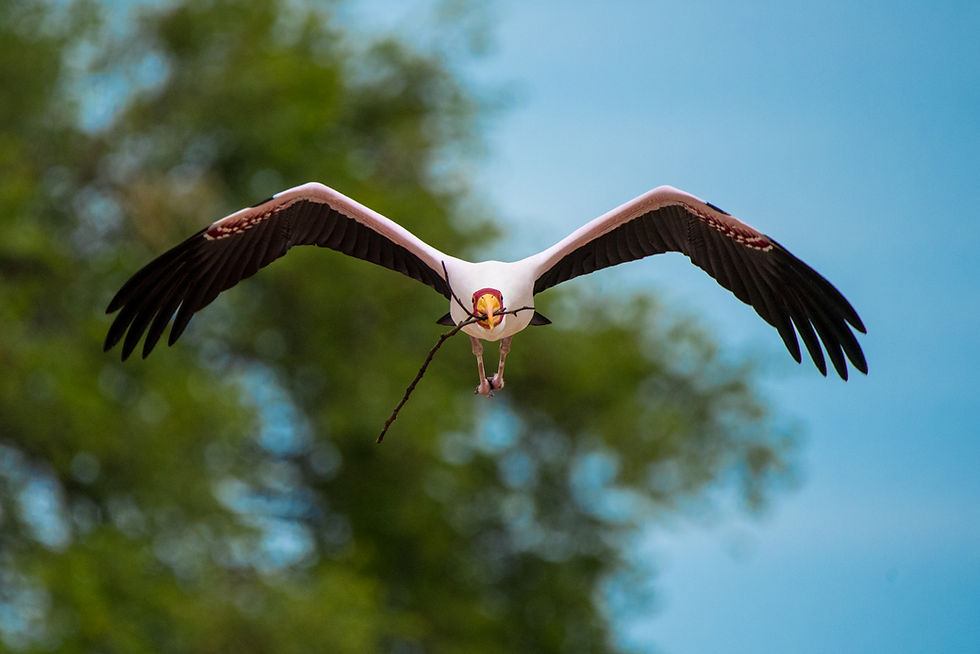














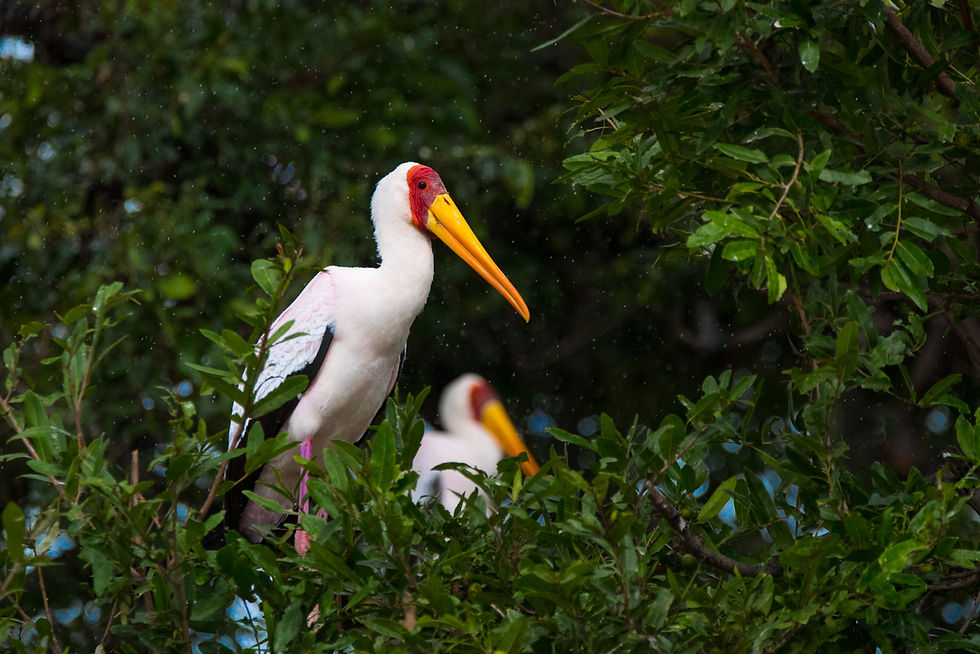





When we returned to camp, we found that two British guests had joined us, and we no longer had all of Nsefu to ourselves. This was at first a bit jarring after being spoiled by the complete seclusion, but they were friendly and enthusiastic recurring safari-goers like ourselves. We headed out on our evening boat safari together, and Willy once again brought us through the Ebony grove, a stunning area where Ebony trees grow that is completely submerged in water. In the late-afternoon glow, the area was positively bewitching. Woodland kingfishers called from the branches, and with sharp eyes you could spot their striking blue color as they watched the water, prepared to dive. We navigated through the maze-like floods, and enjoyed the bird-life and abundance of hippos. A mother and baby hippo peaked their heads above the water to watch us, and I once again thought that hippos have the cutest babies in the animal kingdom.
For sundowners, Willy found a dry riverbank along the Luangwa from which we were able to disembark. The mosquitos were relentless, but the sunset was beautiful, and it was a pleasure to be standing on my own two legs after so much time on a boat. As the pink and orange skies dimmed at sunset, we packed up our little picnic and loaded back into the boat. We quickly caught on to the fact that Willie could not get the motor to start. He opened things up and peered inside with a flashlight. We had already lost almost all of the light. He got on the radio with our camp to let them know that we would be attempting to float back downriver. We had only one oar, which Willie manned, and a bamboo pole which our armed guide, Christopher took control of. The previous days’ current was very strong, and I was worried we would not be able to escape the current with just an oar in order to stop at camp. All of us laughed readily and made light of the situation, which was serious but also such an amazing adventure. I was quite prepared to spend the night on the boat or to camp just off the bank, knowing that we had our park ranger and Willie’s knowledge of the bush to protect us, ponchos for warmth, and some potato chips left over from our picnic for food.
The night was completely still and, with the help of the bamboo pole, Christopher was able to keep us on the left side of the river. We shined a spotlight along the reeds, careful not to disturb any resting hippos. We could hear lions roaring in the distance, and even though we had not yet averted disaster, I already thought that this was the best night of my life. After hours of floating slowly, trying to stay out of the main current in the middle of the river, while also avoiding getting stuck in the crocodile-filled reeds, we spotted the lights of Nsefu up ahead. Willy flashed the spotlight to alert the small staff to our presence so they could prepare to catch our rope and pull us in. They shined their flashlights back at us, and I knew this was the telling moment where we either made it safely back to camp or we had to decide on a plan B, which would surely be less than ideal. Floating down to the Zambezi and over Victoria Falls, perhaps? However, it was not to be–Willy and Chris miraculously managed to steer us to shore with one oar and one bamboo pole and, with lots of cheers and laughter, we disembarked at Nsefu. It was the most marvelous adventure and I asked our very experienced guide how many times he’s had the engine break down on the boat, and with his hearty, infectious laugh he admitted that it was the first time in his 25 years of guiding. How lucky we were to be part of such an adventure.

























The next morning, I woke up covered in mosquito bites. Thunderstorms blew through the previous night, the winds madly tossing our mosquito netting madly about and apparently trapping the hungry insects inside the netting with us. I counted thirty bites on just one arm! Thoroughly covering myself in Deet and Peaceful Sleep, we headed out on the boat, which Willy had repaired overnight with the help over radio of a mechanic. Our destination this morning was a drier area from which we could disembark and go on a bushwalk. We traipsed through the savannah, avoiding the many wet areas. A herd of elephant appeared before us, and we stopped to enjoy their march across a grassy field from ground level. On my right, a hippo kept a watchful eye from the water, trying to decide whether we were a threat to his territory or not. He did have a lovely pond–I would want to protect it too!
On bush walks, you really get the chance to appreciate the smaller wonders of the wild. We found leopard footprints, and listened to the yipping of African Wild Dogs just across a field from us. Elephants heard them too, and were likely causing the dogs to move on. We made an attempt to find them but were unable to intercept them. I spotted a monitor lizard basking in the hot sun from a high perch in a dead tree. We stopped to admire him when, suddenly, he flung himself off the branch in what looked like a suicidal move, and did a spectacular belly flop into the marsh below. It startled all of us before making us laugh–that had to have hurt! But the reptile scurried off unfazed. We posted up under a large shady tree and enjoyed tea and poppy seed cake, while I watched in fascination as a troop of soldier ants emerged from the tree on my right to go on a raid, like tiny vikings. On the hike back, we came upon a field of giraffes laying down, relaxing in the meadow. We walked around them, trying not to disturb the beautiful creatures while not traversing too far out of our intended path. It was wonderful to walk and feel such a part of the bush, rather than witnessing from a vehicle. While walking safaris do not always bring you as close to the animals as driving would, you do feel a part of the wild, which is a special thing in itself.
That evening, we made our way by boat back to the stork colony. On the way, I was fortunate to have another fabulous hippo sighting. While they are adorable in the water, with their little eyes poking out like crocodiles, seeing them jog on land before plunging into the water is just the best thing. The stork colony was also supremely rewarding this evening, as the golden light illuminated the pink mating plumage and the beautiful faces of these storks.








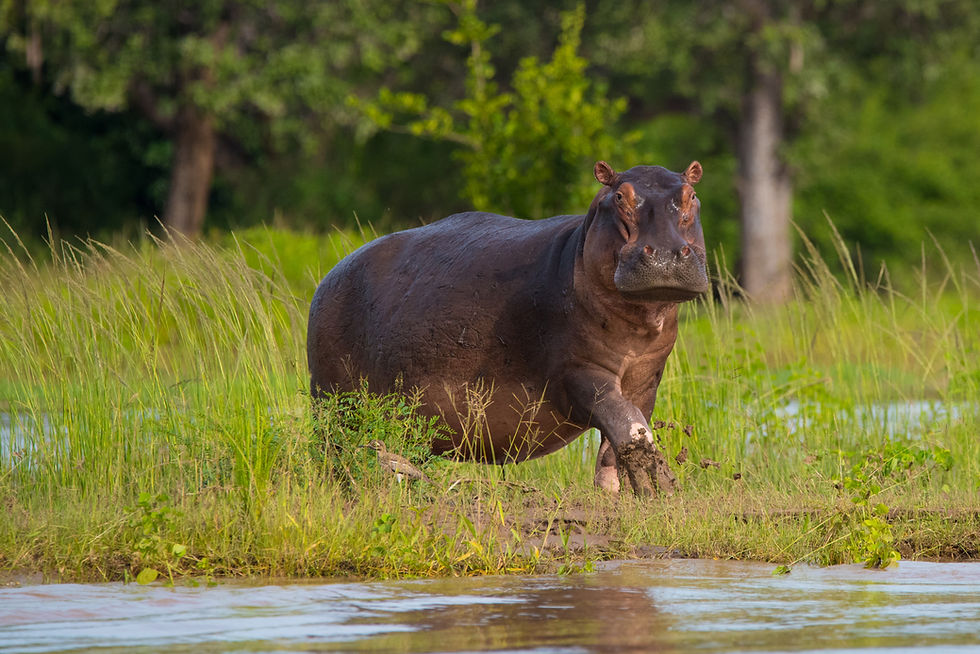

























































The next morning, we said goodbye to Willy and Katherine and Chris, with whom we felt like old friends and said hello to Yumba, our original spotter who had come by boat to ferry us to our final camp. Nkwali proved to be as stunning as the other Robin Pope camps, but with its own unique flavor. The rooms were completely open to the wild, and the other guests visiting for a photography workshop recounted the animals that had visited them in their chalets. A vervet monkey had crept next to one lady while she slept and chewed up her face cream, which was on her bedside table. Another man found a bat trapped in his mosquito netting, while another recounted a monitor lizard that liked to call their chalet home. I love Africa. We did not have any wild visitors to our room, but a monkey did steal the lemon out of my sparkling water which I had briefly set down to photograph a different monkey. Cheeky little primates! The pool at Nkwali overlooks a fine little pond covered with nile cabbage, which Humphrey the hippo calls home. He is quite used to living nearby human guests and while we dined, he slipped back into his pond after his own day's adventure. Our host, Sarrel, told us how Humphrey has had a difficult week, as another male hippo had tried to take over his peaceful little pool. I pitied poor Humphrey and hoped the other hippos would leave him alone.
On our evening game drive (back in the Land Cruiser) we came across a group of elephant with a very young baby. The baby had clearly seen adult males charge before, and chose our vehicle to test his might against. In the most adorable display I have ever seen, the little fellow flapped his ears and ran straight at us, trunk swinging, before getting scared at the last minute, turning around and running away while trumpeting. We could not help but laugh hysterically at this brave little guy, and I hoped we did not wound his ego too much with our laughter. In another corner of the bush, we found a pride of lions with two youngsters. The youth batted each other in the face, honing their fighting skills with this rough-and-tumble play. One of the youngsters had a stubby tail, which our guide said has been that way since he was little. A small group of elephants grazed nearby with a very baby which would be an enticing meal to this pride of lions. The lions, however, were lazy and only casually watched the elephants’ approach. We said goodbye and found a nice open field on which to enjoy sundowners. A screeching sounded from the forest and, shining our spotlight into the woods, we found a giant eagle owl calling. It was a magnificent sighting, and the perfect way to end our final night in Zambia.































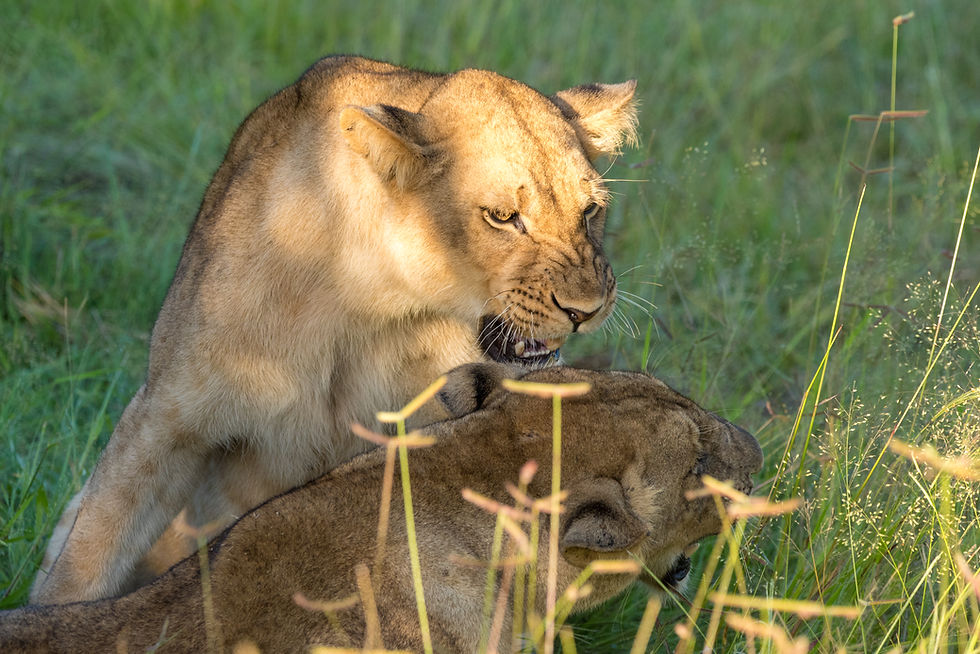

















After a peaceful night’s sleep in our open chalet, the breeze blowing through pleasantly, we woke to find an ideal morning. A rainbow ornamented the blue skies, and made a gorgeous backdrop as our boat approached to ferry us one last time across the Luangwa. We packed our bags up and loaded them into the boat. The familiar, heart-wrenching awareness that it was almost time to say goodbye to Africa overwhelmed me, and I appreciated every last moment of this final morning drive. I took notice of the lushness of the air, the smell of the vegetation, and the sound of the hadada ibis calling out. I smiled at the elephants, so wise and family-oriented. I admired the mightiness of the lions, who never fail to impress. I already planned in my head when next I could return, and realized that I had fallen in love with yet another place on the African continent.



























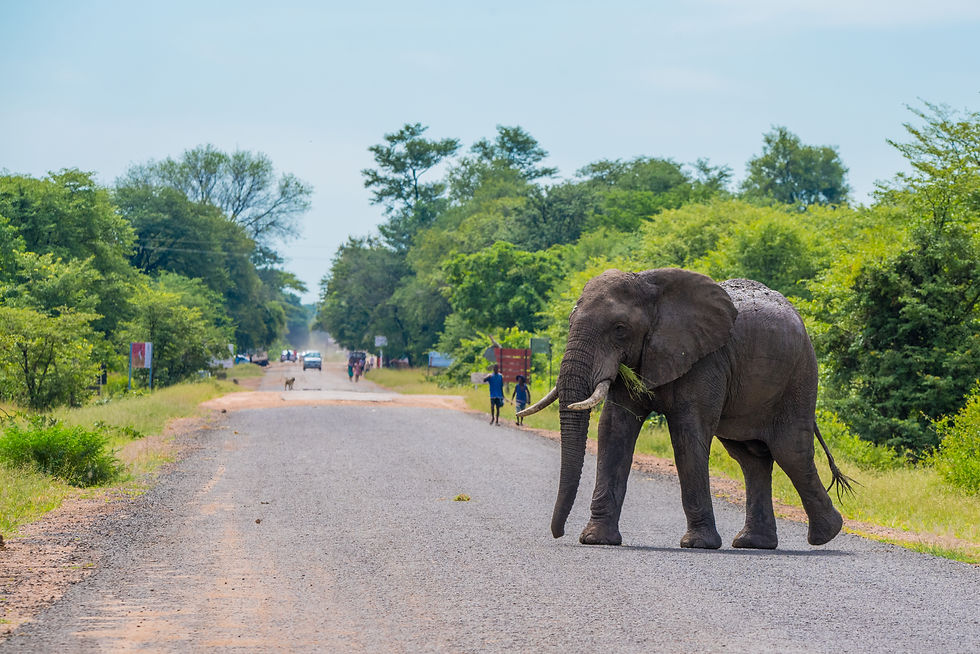


The Emerald Season in the Luangwa Valley is a unique safari experience, and one that will stay with me long after I land on the dry, wintery ground in Colorado, longing to return to the saturated, earth-scented air of Zambia. The already-remote region is even more wonderfully remote when the floods block access and when many camps close. The ones that do remain open cater to those with an adventurous spirit–those that enjoy the bumpy ride as the vehicles traverse challenging terrain, those that think rain merely adds to the atmosphere, and those that wish to witness something wholly unique. For the lucky individuals that embrace this heavenly season, as I did wholeheartedly, the rewards are substantial and they will bear witness to a very special place; one teeming with life, growth and, yes, water.





Comments